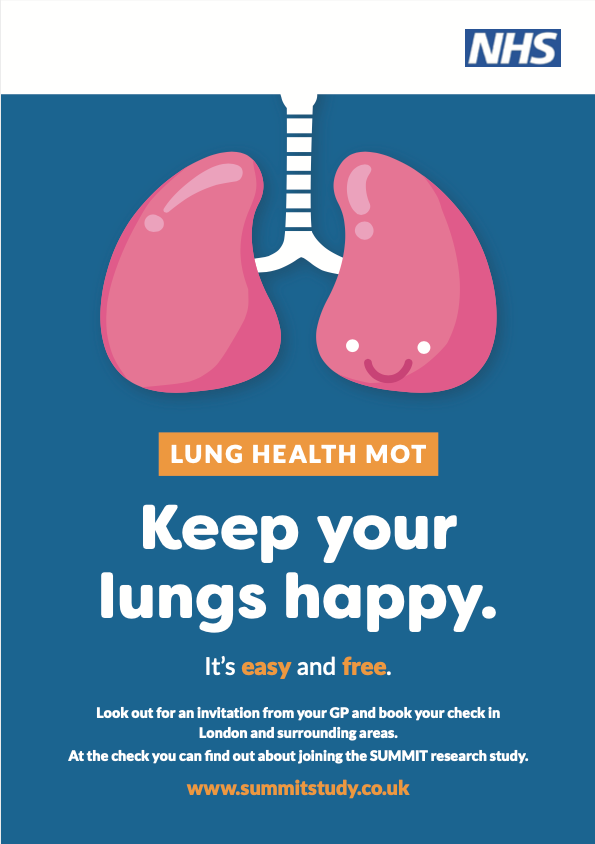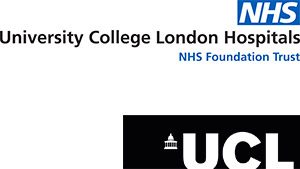Lung Cancer Screening
People who smoke or used to smoke regularly in the past may be at increased risk for lung cancer. If found early, there is a greater chance that lung cancer can be treated successfully. A large clinical study showed that screening people at increased risk using low dose computed tomography (LDCT) scans can save lives by detecting lung cancer at earlier stages.1 As part of the SUMMIT Study, participants with a significant smoking history who meet certain criteria will receive LDCT chest scans.
About the Lung Health Check
Approximately 25,000 residents of London and surrounding areas aged between 55 to 77 years who currently smoke or have smoked regularly in the past who meet eligibility criteria will be invited by their GPs to a free Lung Health Check. The Lung Health Checks will take place by appointment at four different sites in London (see map for site locations).
At the Lung Health Check, individuals will meet with a healthcare professional to review their health and family history and take some basic measurements such as weight and blood pressure. They will also be asked to do a spirometry test to check their lung capacity by blowing into a special device. Individuals who currently smoke will have an opportunity to discuss available smoking cessation support services with the health care professional. Eligible Lung Health Check attendees will also be provided with information about the SUMMIT Study and offered the opportunity to take part.

Participation Requirements
Lung Health Check attendees who are eligible for and choose to participate in the SUMMIT Study will be asked to read and sign informed consent documents. The following study activities will be completed on the day of the Lung Health Check:
- Fill out a confidential health questionnaire
- Have their blood taken
- Receive a low dose computed tomography (LDCT) chest scan
SUMMIT Study participants will receive a £20 shopping voucher to compensate for their time and effort, as well as detailed information about next steps before they leave the clinic. After their first appointment, participants will be asked to return for an annual appointment for the next two years, where they will also fill out a questionnaire and have their blood taken. Some participants will also have an LDCT scan at these appointments. All participants will receive a £20 shopping voucher at each annual study follow-up visit.
Within about three weeks of the LDCT scan, participants and their GPs will receive a letter with the results of the scan. Blood test results will not be provided to participants or their GPs, as the blood test is still in development and not yet validated. LDCT results will help determine the schedule of participants’ follow-up visits.
LDCT
Low dose computed tomography (LDCT) is an imaging method that can be used to screen people for early stage lung cancer. An LDCT scan uses x-rays to take detailed pictures of the chest and lungs. These pictures are processed by a computer and then checked for early signs of lung cancer and other abnormalities by specially trained doctors (known as radiologists).
Studies have shown that LDCT scans can save lives when used to screen for lung cancer in people who smoke or used to smoke regularly.1 Currently, LDCT is not widely available in the UK. The SUMMIT Study aims to assess the feasibility of implementing a lung cancer screening programme in order to help more people in the UK get screened.
Schedule of Visits and Follow-Up:
Participants will be asked to come back for follow-up appointments each year for the following two years. At these appointments, they will have a blood sample taken, and fill out a confidential health questionnaire, and some will receive further LDCT scans. In some cases when it is clinically appropriate, people with abnormal findings may be asked to come back three months after their LDCT scan for an additional scan. For each annual follow-up visit participants will receive a £20 shopping voucher to compensate for their time and effort.
1 National Lung Screening Trial Research Team, Aberle D.R., Adams, A.M, et al, Reduced lung-cancer mortality with low-dose computed tomographic screening. N Eng J Med. 2011;365:395-409.



